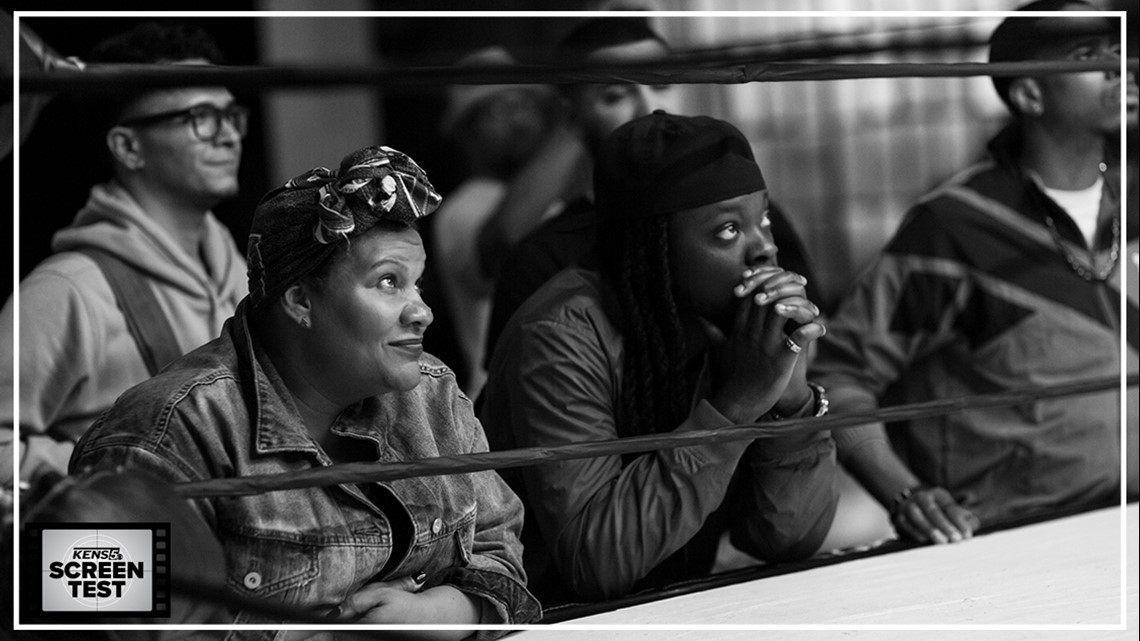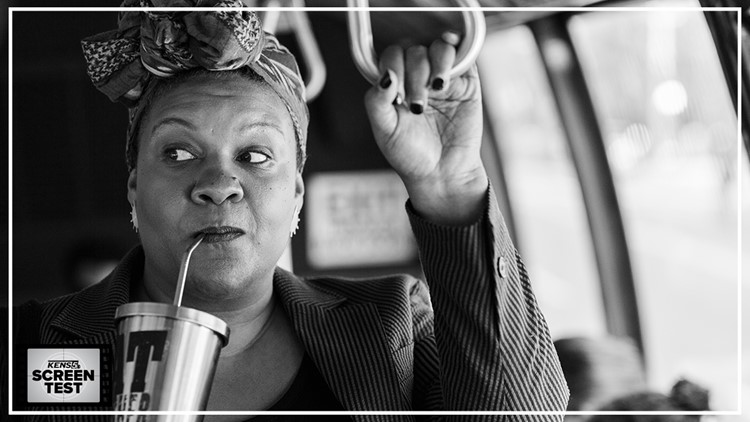By its nature, there isn’t often space in mainstream moviemaking for scenes in which women are rap-battling – channeling testimonial power and passion into rapid-fire verbal persuasion – so it’s a minor miracle that movie-watchers will have access to such a sequence when the multifaceted dramedy “The 40-Year-Old Version” hits Netflix Friday. The scene is memorable for what it shows, and extraordinary for what it doesn’t. In 99 other (ahem) versions of the film, things would culminate triumphantly as our protagonist – a Black middle-aged woman navigating the rocky terrain of creative liberty in an industry that suppresses her of it – would be nudged into the spotlight where she suddenly discovers the right mix of will and know-how to launch into perfect rhymes and crowd-pleasing stardom. Applause. Emotion. Curtains.
That doesn’t happen in this version of “The 40-Year-Old Version.” Radha Blank – the character – remains on the sidelines in appreciative observation because Radha Blank – the director, the writer, the lead actor and still somehow so much more here – sees reinvention as a messier journey than your typical character study that is just fine deploying it as shorthand for resolution on the way to applause, emotion, curtains, thankyouverymuch, seeyounexttime. And in a movie that, though overly busy, defiantly approaches massive questions of sociocultural concern with refreshing candor, Radha (and Radha) proves leaving the curtains up on the subject of art’s gentrification is necessary in order for authenticity to find the spotlight. The result is a brilliant work as inviting as it is biting, as funny as it is interrogatory.
In the movie, Radha is a Harlem-based artist nearing 40, which means she’s about to go a decade after appearing on the theater scene’s 30-under-30 ranking without making good on the implied potential others recognized. Is it lack of opportunity? It’s complicated. While moonlighting as the teacher of a small high school theater group where the kids are motivated more by what content they can slip past Mrs. B than creative merit (“Can we come up with an idea that doesn’t involve genitalia?”), her best friend and agent Archie (Peter Kim) works to magnetize Radha’s ideas to big-shot producer Josh Whitman (Reed Barney), and he’s pretty good at the job.
The dual roles Archie plays in Radha’s life will yield its rough patches as she begins traipsing into other spheres of artistic creation, but for now he’s just trying to convince Josh that her latest concept for a play, “Harlem Ave,” is worth financing. More importantly, it’s Radha’s hope (and one she fully knows is far-fetched) that his whiteness won’t distort her story into something else entirely—a “poverty porn” tale that goes down easy for white audiences, whom he insists the show would have to attract to be viable, thus making it worth attaching his name to.
“The 40-Year-Old Version” gracefully insinuates plenty of metaphorical tonnage with the power dynamics of this trio of characters. Their respective backgrounds indicate the varying levels of awareness about their roles in helping each other attain success. More implicitly, it indicates different understanding about the stakes of the inherently contradictory, yet increasingly relevant, intermingling of art and commerce; Josh just wants to fill seats, while Radha is desperate to retain her voice in the face of artistic compromise. Which is why, hell no, she isn’t into the idea of a white protagonist leading “Harlem Ave” – a play about the effects of gentrification on Black denizens – and, hell no, despite how much she may owe in rent, she won’t take up Josh’s offer to work on the “Harriet Tubman musical” (yikes) that he’s ecstatic to bring to white audiences who are privileged enough not to have to worry about the potentially harmful forms some stories end up taking.
That stories are integral to the preservation of history is both well-worn sociological scripture and foundation to Blank’s thoughtful screenplay, but who gets to decide what art is made – and therefore remembered – is the real question she’s tugging at. Aside from being an endearing, frank and frankly hilarious character, Radha is sincere. But she struggles to be taken seriously, and in her struggles are reflections of current dilemmas that sharpen the urgency of Blank’s assertions. The memory of “Green Book” winning Best Picture at the Oscars despite trafficking in outdated suggestions about race still looms large, and it was just in the past few weeks that Disney’s live-action “Mulan” released to criticisms about its inauthentic depictions of Chinese culture, largely chalked up to the bevy of white faces behind the scenes. Even more recently, “The Farewell” director Lulu Wang raised her eyebrow online upon news of Ron Howard being tapped to tell another story rooted in Chinese specificities.
The ironies aren’t just prevalent; they’re baked into an American entertainment industry that “The 40-Year-Old Version” is keeping close tabs on, and which has only strengthened the case for the film’s existence since it won directing honors for Blank at Sundance months ago (an impressive coming-out party, and all the more impressive considering she’s new to the world of movies, having most recently been part of the writer’s room on “She’s Gotta Have It”). There’s a reason that Josh, upon telling Radha “Theater misses you!”, doesn’t detect the subtle tragedy in her voice as she responds: “Is it looking for me? Because I’ve been here.” It’s a funny line and a sad one that underscores the subtle approach by which Blank approaches the material. The film is witty and light-footed, to be sure, but it also contains undercurrents of overdue reckoning to its questions.


Blank’s dialogue, meanwhile, is quippy and candid without betraying Radha’s conundrum; frustration is a sense of place that’s more ideological than physical, and it’s the claustrophobic combination of Radha’s age and strict principles that moves her to impulsively shift in the direction of hip-hop. She’s got plenty to vent about, and her natural syllable-stringing skills catches the attention of a work-from-home music producer, D (Oswin Benjamin, wonderful in an unexpectedly complex role). But if it’s delayed salvation Blank hopes to find, life – as well as the same worldly machinations that have kept her right where she has been for years – has other lessons to offer about herself first.
Which is why it’s all the more impressive that Radha commits to exploring them with a grounded flair that borders, at times, on pseudo-documentary. Consider the opening scenes, when Radha Blank the writer-director and Radha Blank the protagonist are briefly inseparable as she asks the denizens of her Harlem neighborhood – the block elder, the corner market cashier, the Apple Pod-wearing teens – what they think it means to turn 40. Their responses range from hilariously snarky to suggestive to distracted, confirming the film’s throwback indie feel that the grainy black-and-white cinematography initially hints at. Bronx native Eric Branco is behind the camera, and I think his handheld maneuvers – the way he gets right up to Blank's face during a DIY recording session or haphazardly zips around to a new subject to fill the frame – does more to emphasize the story’s rough-hewn spirit than the monochromatic style.
Blank’s full-blooded dedication to her many characters begins to get the better of her in an overlong third act that scrambles more than it glides. But if the unkeptness is a byproduct of the director slightly overextending her reach, it also makes sly narrative sense for the concessions and confessions that Radha ends up making. Blank’s wonderful debut feature may very well set her on the overdue path to stardom, but things won’t come as easy for the on-screen version of herself that’s constantly sipping diet sodas and cracking wise. The destinations we’d expect for creator and creation are – obtusely and fascinatingly – reversed, despite both of them having unearthed their voice. But that’s only where reinvention starts.
"The 40-Year-Old Version" is rated R for pervasive language, sexual content, some drug use and brief nudity. It begins streaming on Netflix Friday.
Starring: Radha Blank, Peter Kim, Reed Barney, Oswin Benjamin
Directed by Radha Blank
2020
OTHER SCREEN TEST REVIEWS
- ‘Charm City Kings’ Review: A vibrant Baltimore becomes the stage for Black teens’ joys and pains
- ‘Possessor’ Review: Brandon Cronenberg’s newest is a cerebral psychothriller and a mind-melting minefield of self-disintegration
- ‘Save Yourselves!’ Review: Aliens and millennial apathy come for Jack Reynolds and Sunita Mani in charming sci-fi-comedy
- ‘Ottolenghi and the Cakes of Versailles’ Review: Sumptuous ideas, sour presentation
- ‘Kajillionaire’ Review: Miranda July’s newest oddball drama is her most narratively triumphant
- ‘The Nest’ Review: Jude Law, Carrie Coon spiral toward marital oblivion
- ‘The Secrets We Keep’ Review: Noomi Rapace shines in shoddy morality play
- ‘The Devil All The Time’ Review: Tom Holland leads all-star cast in glum, aimless portrait of a tarnished America
- ‘I’m Thinking of Ending Things’ Review: Charlie Kaufman resumes his search for meaning in haunting Netflix head trip
- ‘Tenet’ Review: Christopher Nolan’s time-bending exercise was made for an audience of one



